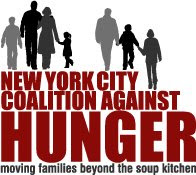Following three extensions and seemingly interminable debate, the latest compromise farm bill has, like earlier versions, been met with the threat of Presidential veto. Congressional negotiators agreed to the $296 billion legislation, which increase funding for nutrition programs, including food stamps and emergency food programs, by $10 billion, while expanding an initiative to provide more fresh fruits and vegetables in school meals. President Bush has denounced the bill citing overspending and claiming that it offers no “real reform.” Farm subsidies have been a primary point of contention between the President and legislators, though subsidies account for only an estimated 16% of farm bill spending, according to House Agricultural Committee Chair Collin Peterson. NYCCAH Executive Director Joel Berg urged swift rectification of the most recent bill, noting that the absence of a new farm bill exacerbates the current hunger crisis. “The federal government has the resources and the scope to sole this problem,” said Berg. Congress may overturn a presidential veto with a two-thirds vote in each chamber of Congress. The July 2007 version of the bill passed by 231 votes in the House and 79 in the Senate; a two-thirds majority would require votes of 290 and 67, respectively.
Providing news and commentary on issues facing the City's anti-hunger community

The New York City Coalition Against Hunger represents New York City’s over 1,200 soup kitchens and food pantries and the 1.3 million low income New Yorkers who are forced to use them. The Coalition works to meet the immediate food needs of low-income New Yorkers and enact innovative solutions to help them move “beyond the soup kitchen” to self-sufficiency.
Blog Archive
-
▼
2008
(116)
-
▼
May
(12)
- Fast Food Tax Breaks Conflict with City Health Ini...
- Economic Crisis Fuels Twin Threats of Hunger and O...
- What's At Stake
- Congress Set to Re-Play Veto Override
- Hunger and Abundance
- Rising Food Costs Pose Increased Threat to Seniors...
- House Passes Farm Bill With Veto Override in Sight
- AG Secretary Fumbles on Farm Bill Nutrition Title
- Executive Director Berg Calls on City to Increase ...
- Seven Months Later, Farm Bill Still Faces Veto
- Faced with Supermarket Shortages, City and Communi...
- Court Mandates HRA Compliance with Food Stamp Proc...
-
▼
May
(12)
2 comments:
President Bush is right! There, I said it. Of course I'm sure we don't have the same kind of reform in mind.
Indeed. One of the interesting things about this farm bill is that it has prompted not only bipartisan support but similar criticism from both sides of the aisle, albeit for different reasons.
Post a Comment